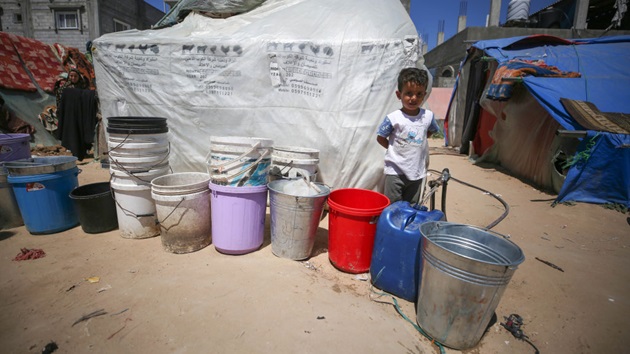(GAZA) — A man in the Gaza Strip is using solar panels to clean water for his neighbors – a seemingly small gesture that has large consequences at a time when the region is in the midst of a humanitarian crisis.
“Yesterday, I filled this car with clean water from the well, 6,500 liters, and distributed it among people in need of water,” Mohammed Assalia told ABC News. “Some people use these wheelchairs to transport the water they fill, which is kinda sad but it does the thing.”
As the resource becomes more scarce, Assalia said he is now looking for a way to reach more people in the most devastated area of the Gaza Strip, six months since Israel declared war on Hamas. The high costs involved with the project may hinder his ability to do so without help, he says.
“With the solar-powered well in my house, at least 1,000 people benefitted and received clean water every day,” Assalia said. “Now people from other neighborhoods have come to use it and we’re trying to help more by operating as many wells as possible.”
Assalia said he has coordinated a group of people to help with his project, capitalizing on each person’s expertise: Khalil Samara, an alternative energy engineer; Mohammed Hajj-Ali, a welder installing the bases for the solar panels; and Masoud Nabhan, a plumber experienced with fixing wells.
He set up a fundraiser to tackle the inflated costs of solar panels and materials he needed, which he said were available but cost around four times the pre-war amount.
“All of the needed materials are currently available here in the North [of Gaza], Al-Yazji company for solar energy and other companies still have materials. However, these materials have become very expensive. An example is a 535-watt solar panel used to be 700 NIS ($192). Now it costs 2,400 NIS, ($657),” Assalia said.
Since the start of the blockade Israel imposed on Gaza after Hamas launched a terrorist incursion on Oct. 7, shortages and contamination have severely impeded health care access, creating a water crisis, according to the United Nations Relief and Works Agency (UNRWA), Doctors Without Borders (Médecins Sans Frontières) and other non-governmental organizations (NGOs) monitoring the area.
“Access to sufficient amounts of clean water is a matter of life and death. Children in Gaza have barely a drop to drink,” UNICEF executive director Catherine Russell said in December.
In February, UNRWA reported that around 70% of the population of Gaza was drinking salinized or contaminated water. UNICEF said at the time at least half of the water and sanitation facilities in Gaza had been destroyed or damaged.
Flu, dehydration and hepatitis are among some of the main consequences of the water crisis in Gaza, according to MSF staff on the ground.
While both the United Nations and MSF mobilized to mitigate the water crisis, both organizations have said that other types of shortages stand in the way, including the limited number of trucks allowed into the enclave carrying aid and fuel.
People in Gaza have to rely heavily on grassroots projects like that of Assalia’s group. When he started, he said he used his own savings to operate the water well for his neighbors.
“Most of the wells could not run due to the lack of electricity and destruction of the infrastructure,” he said. “So I contacted an alternative energy engineer and I had him power up a personal well on solar energy. I paid him 400 shekels ($107).”
He added, “I don’t want anything in return, all I want is to help my people and leave a footprint.”
Copyright © 2024, ABC Audio. All rights reserved.












